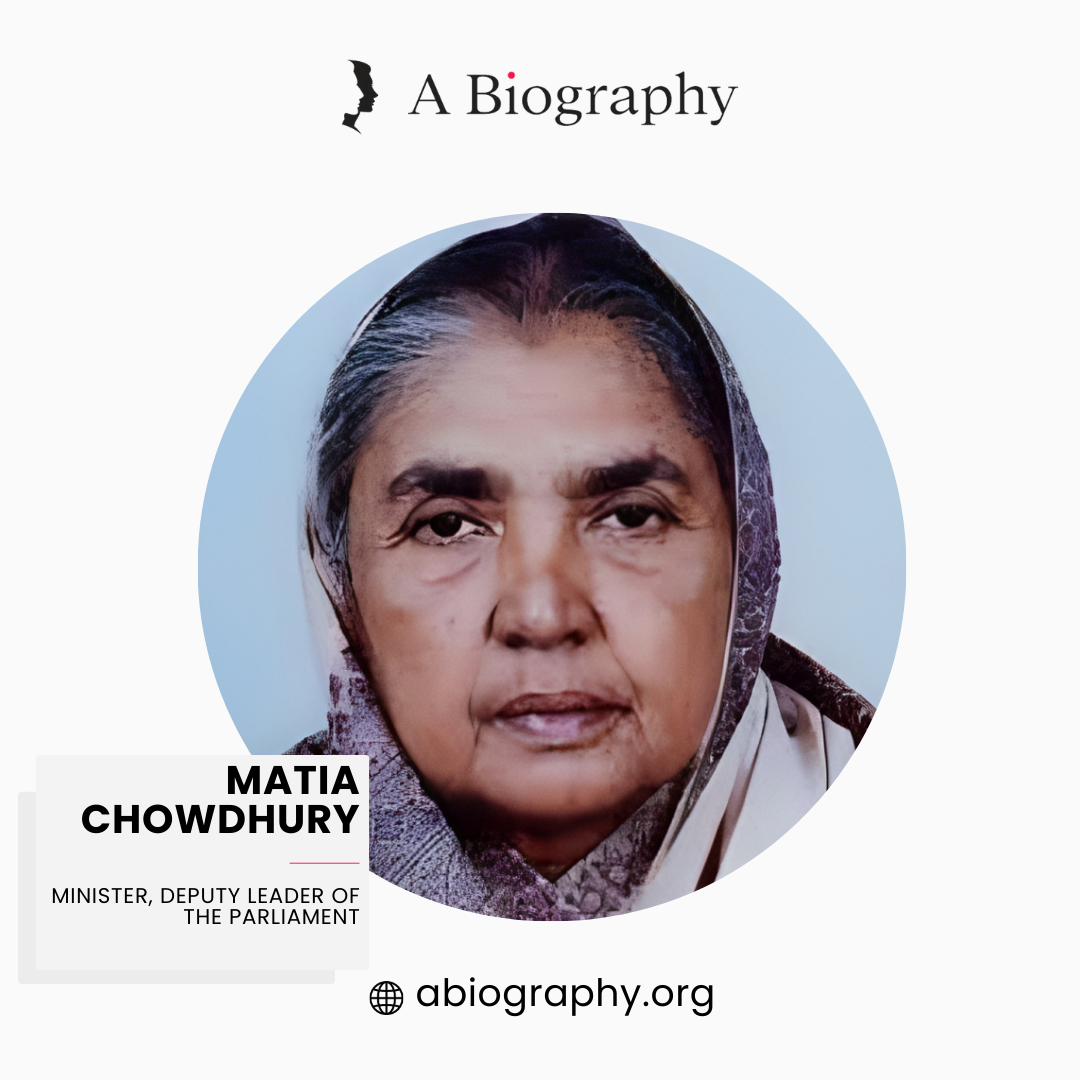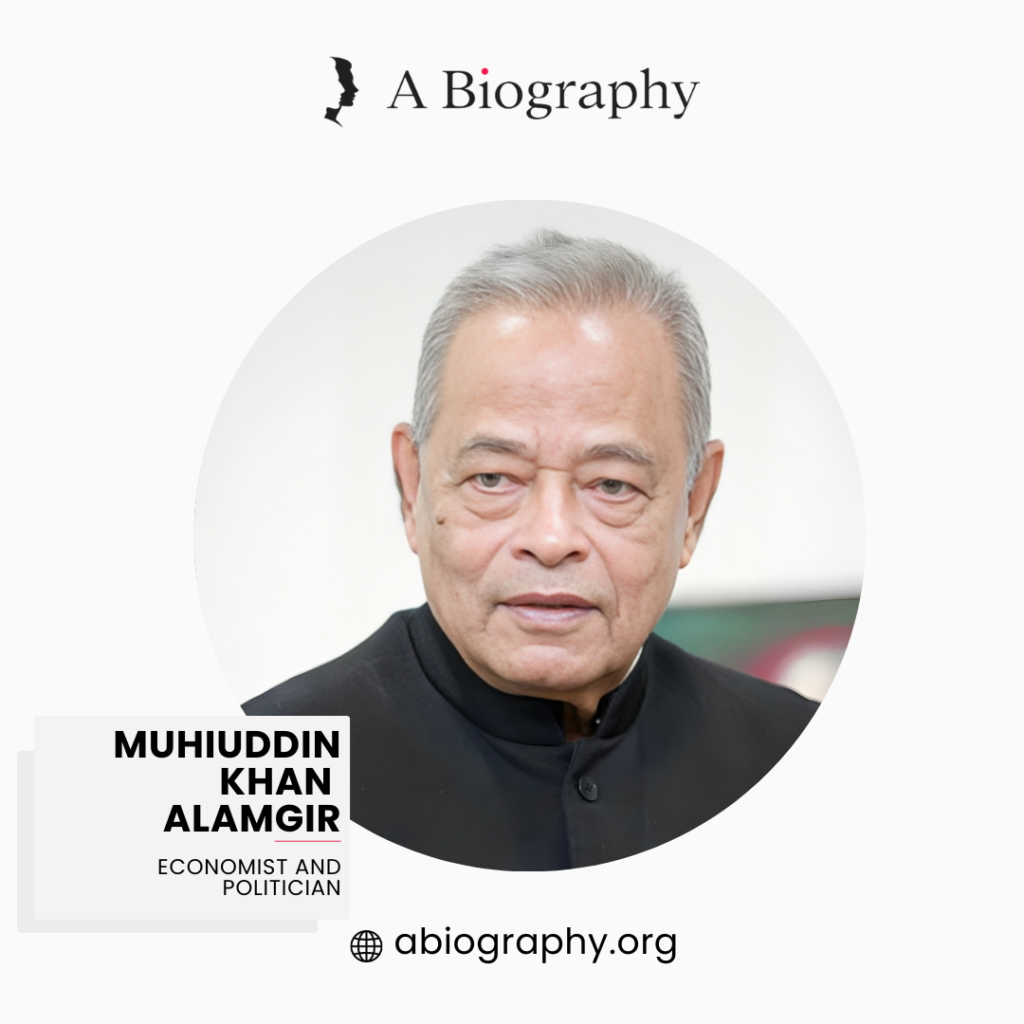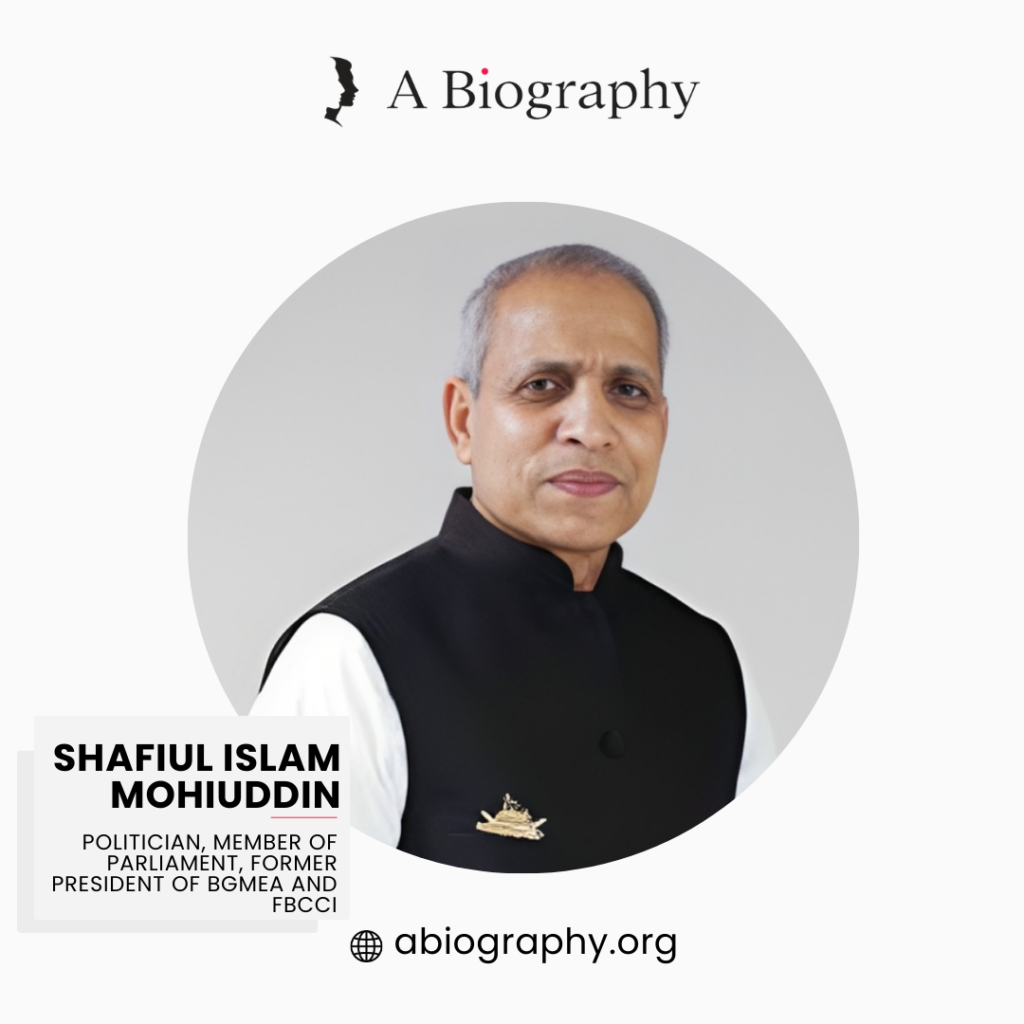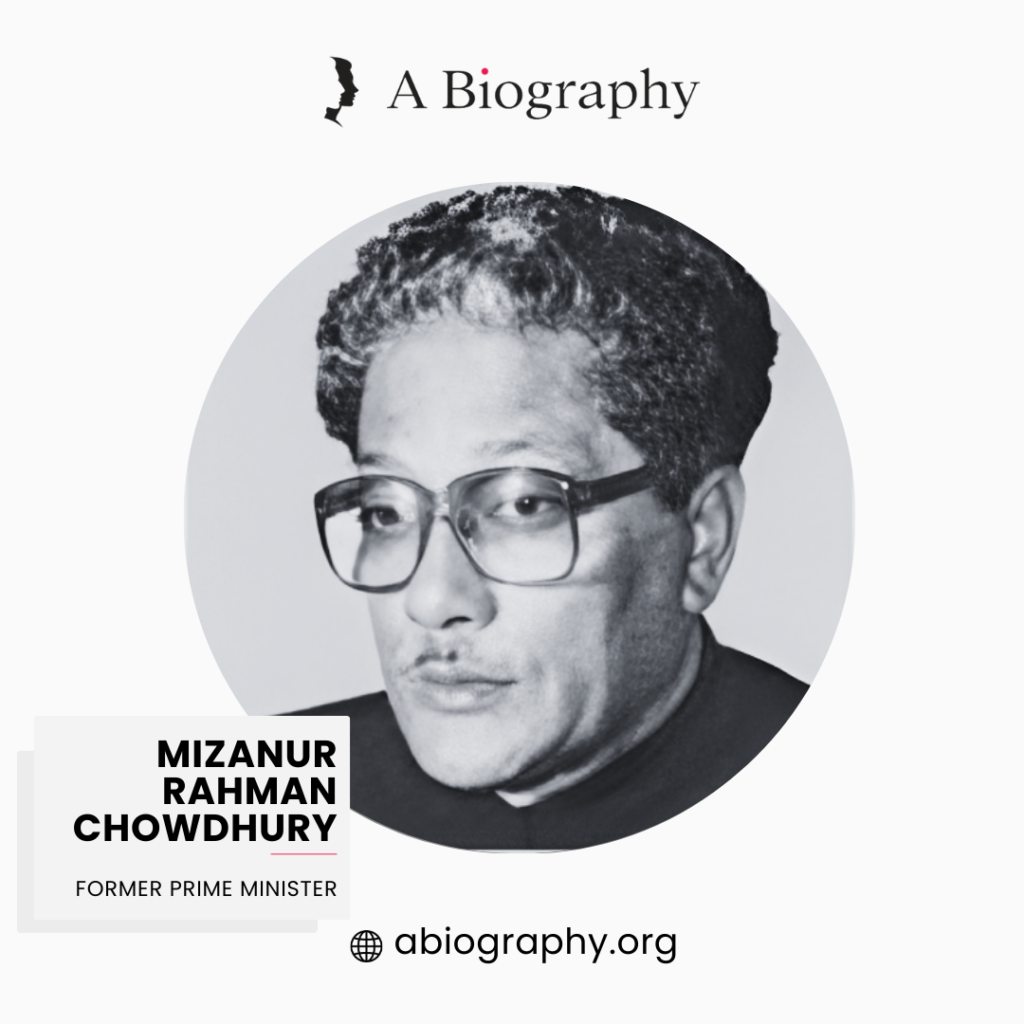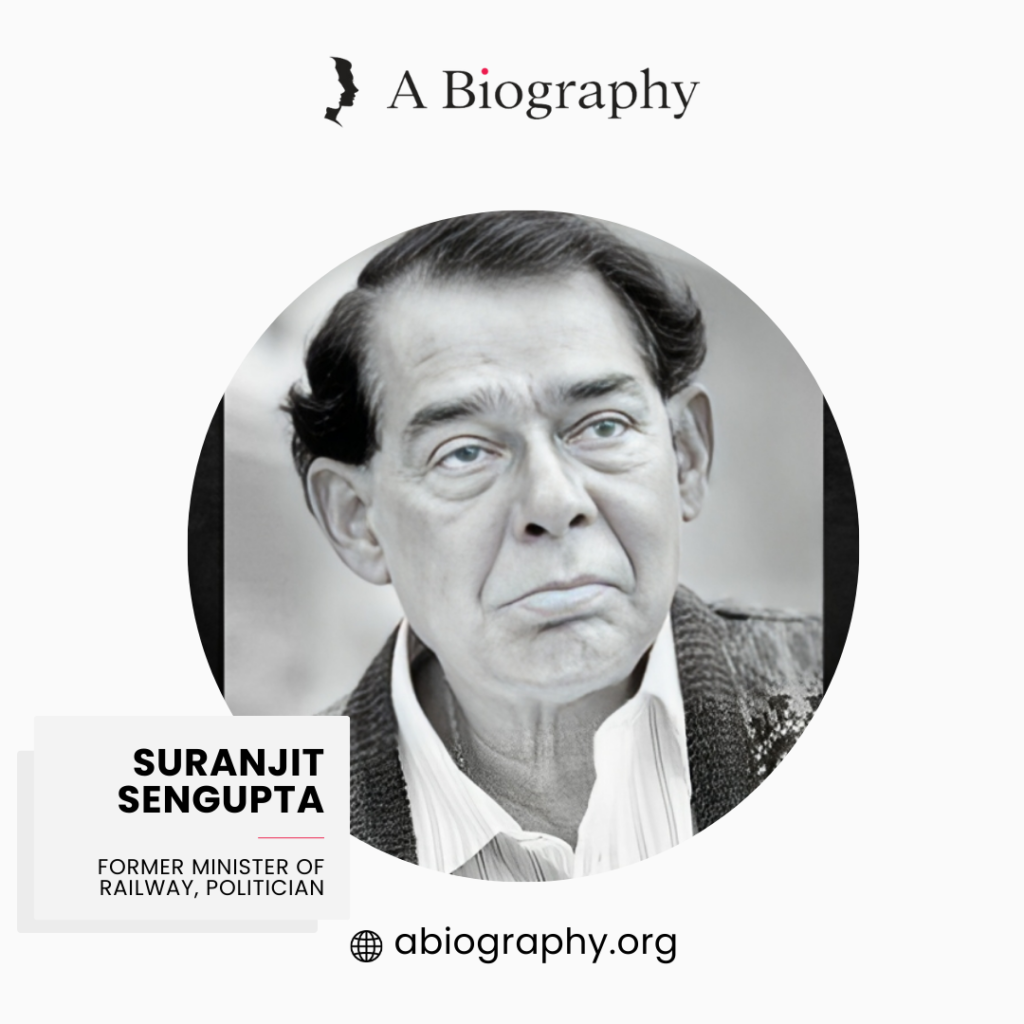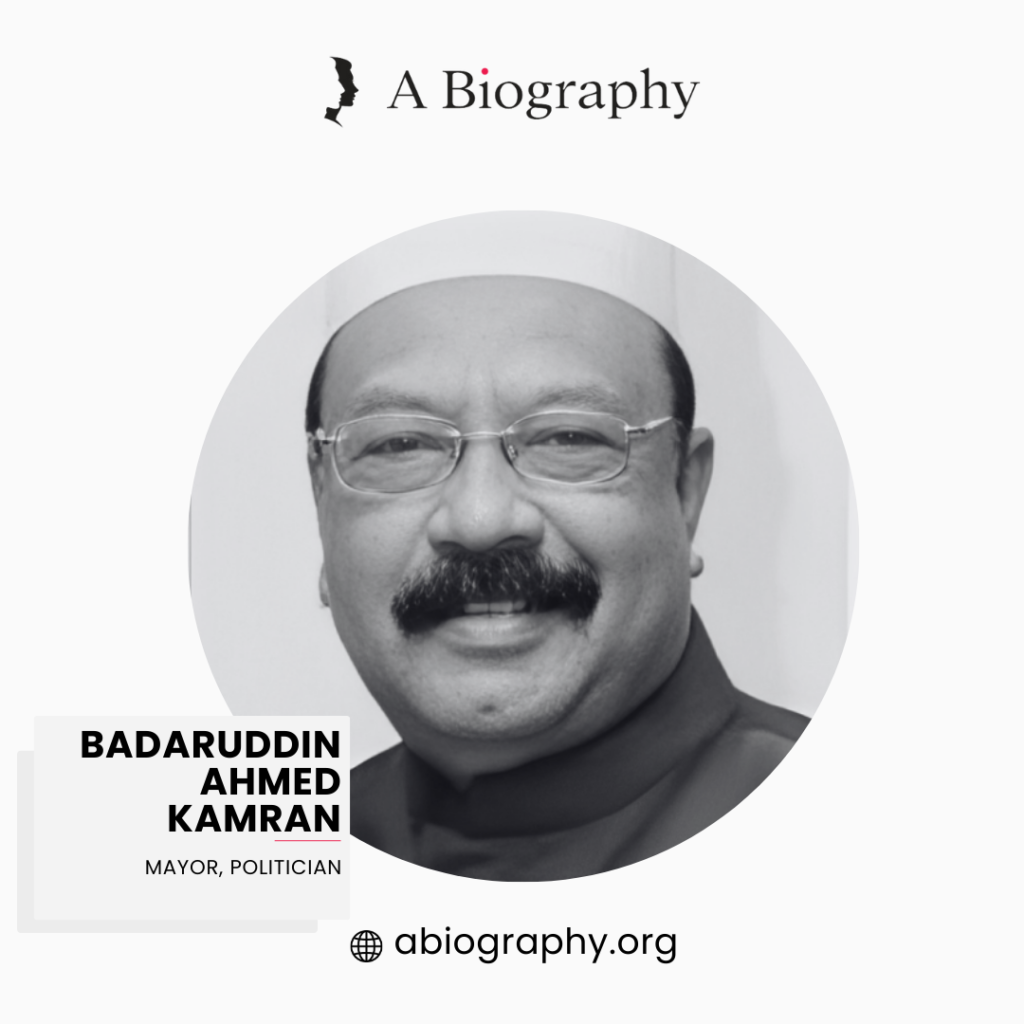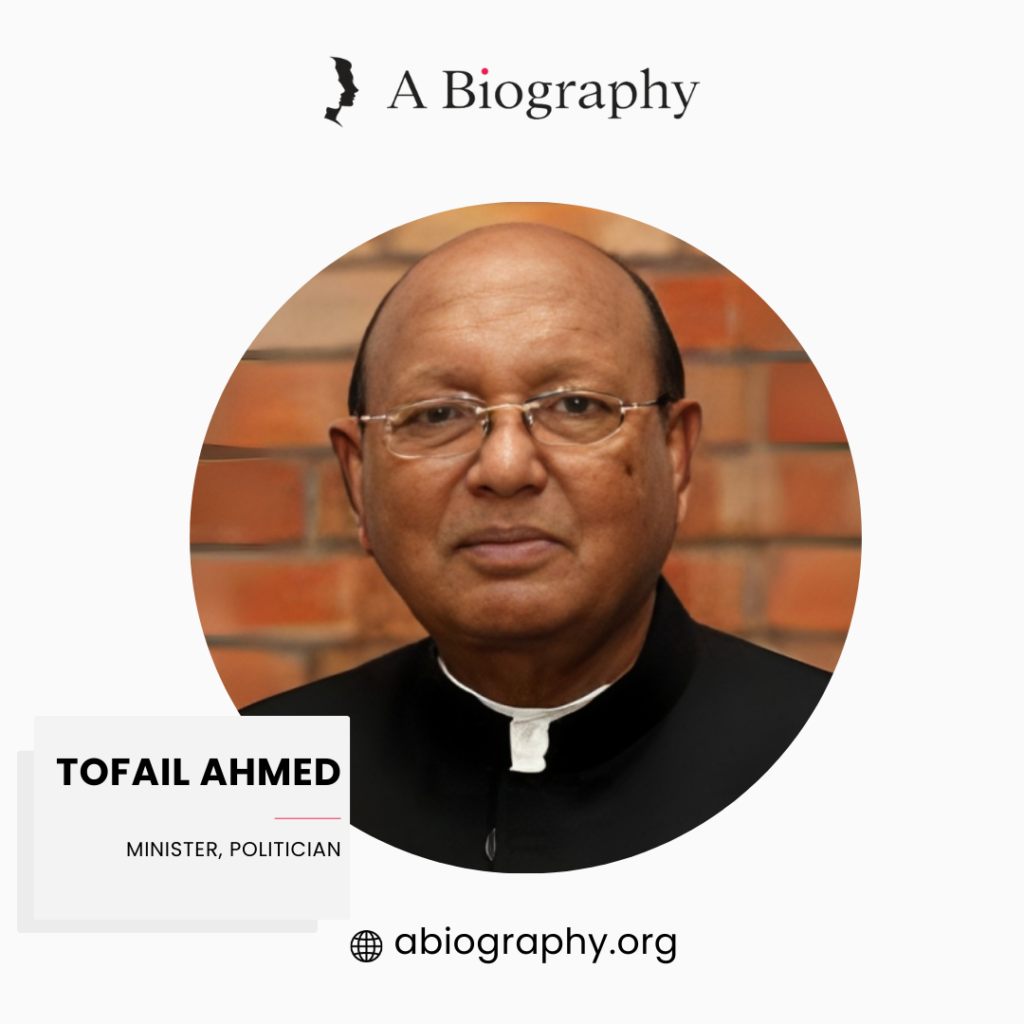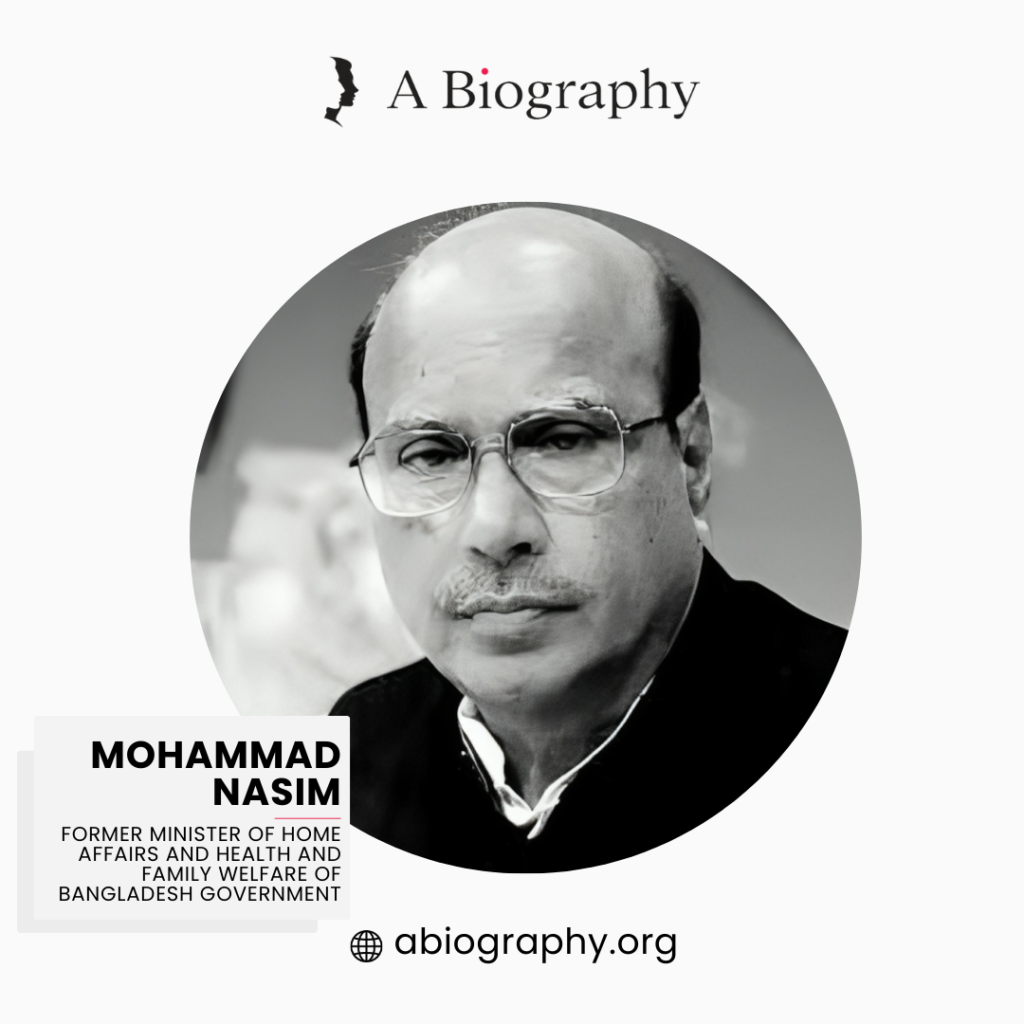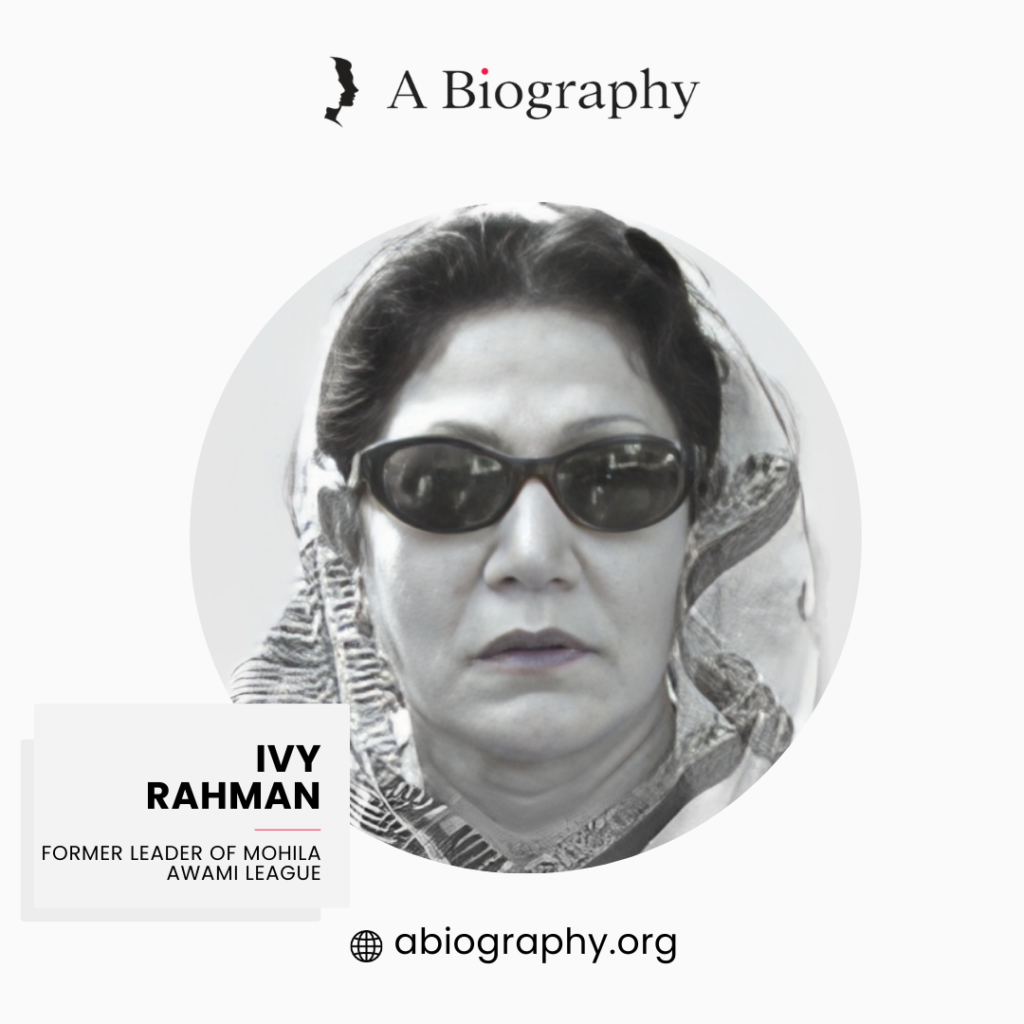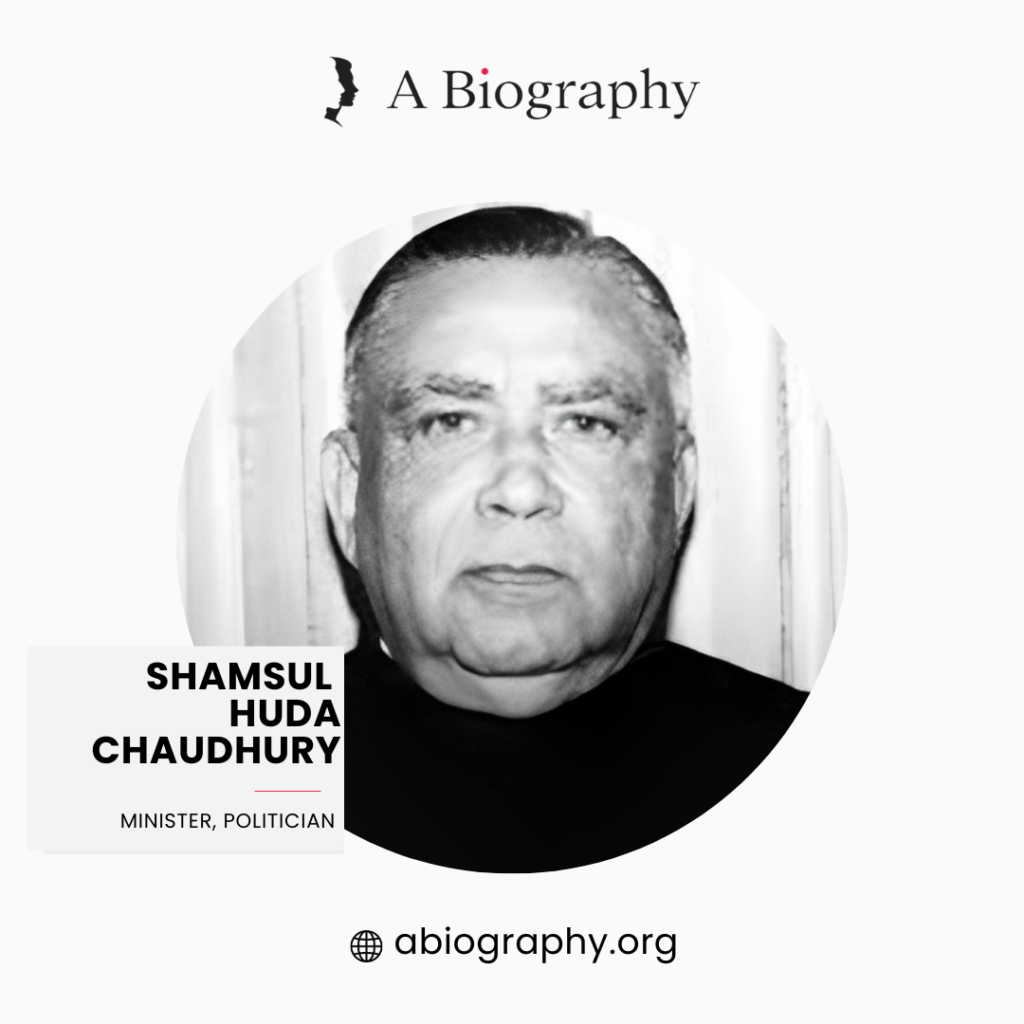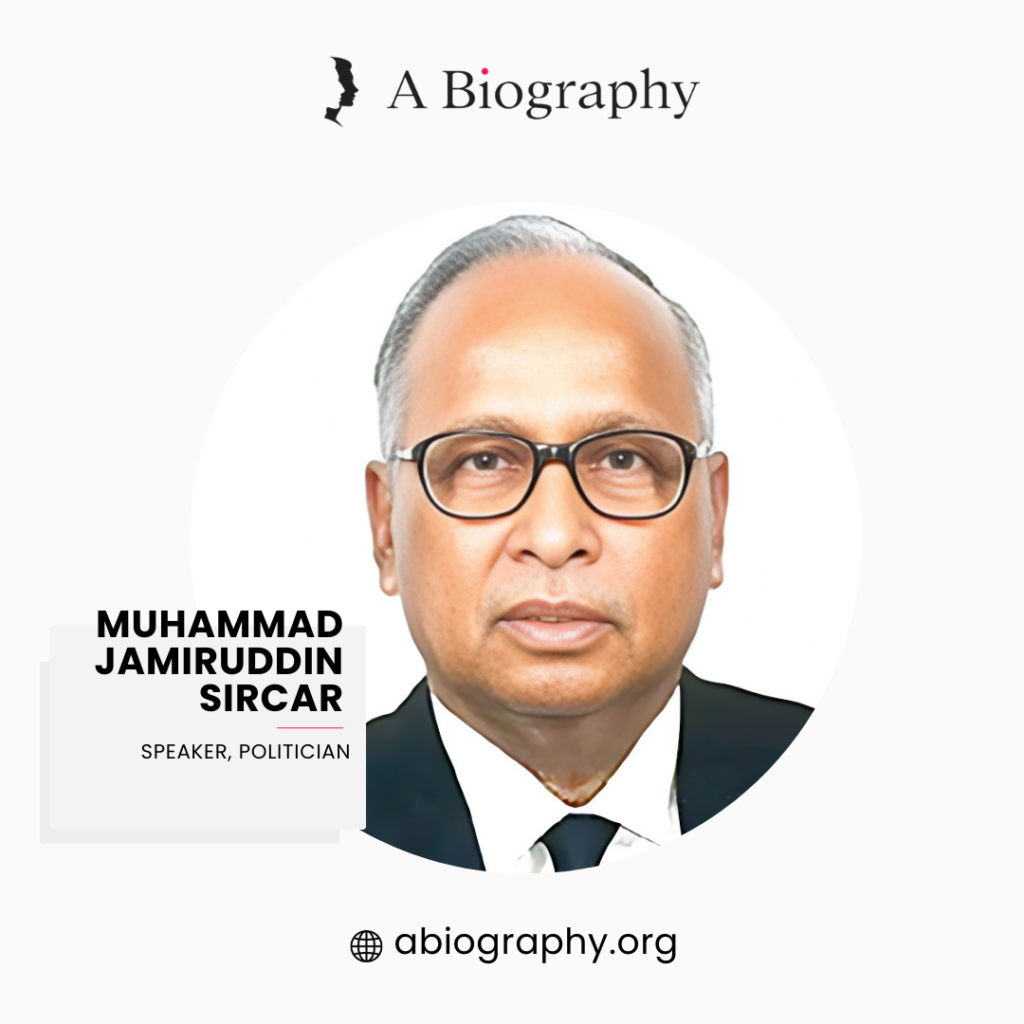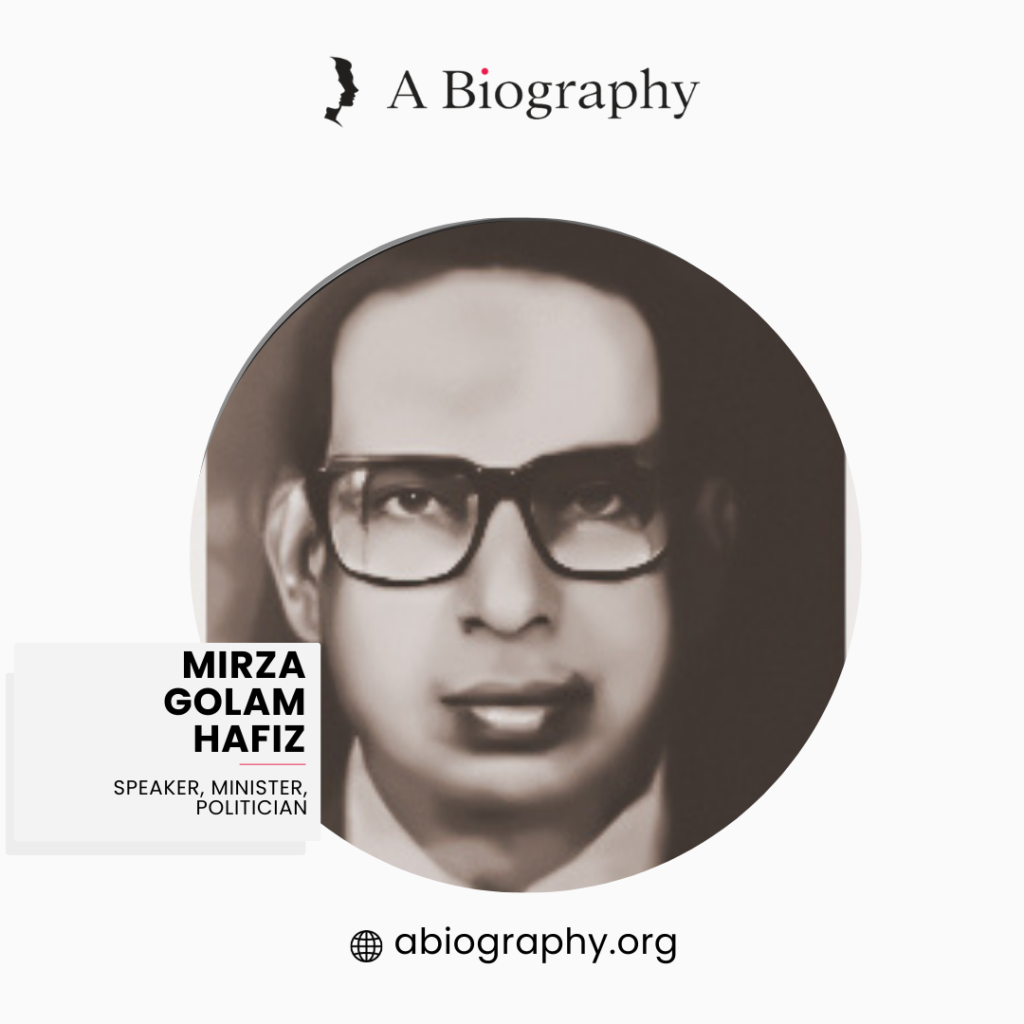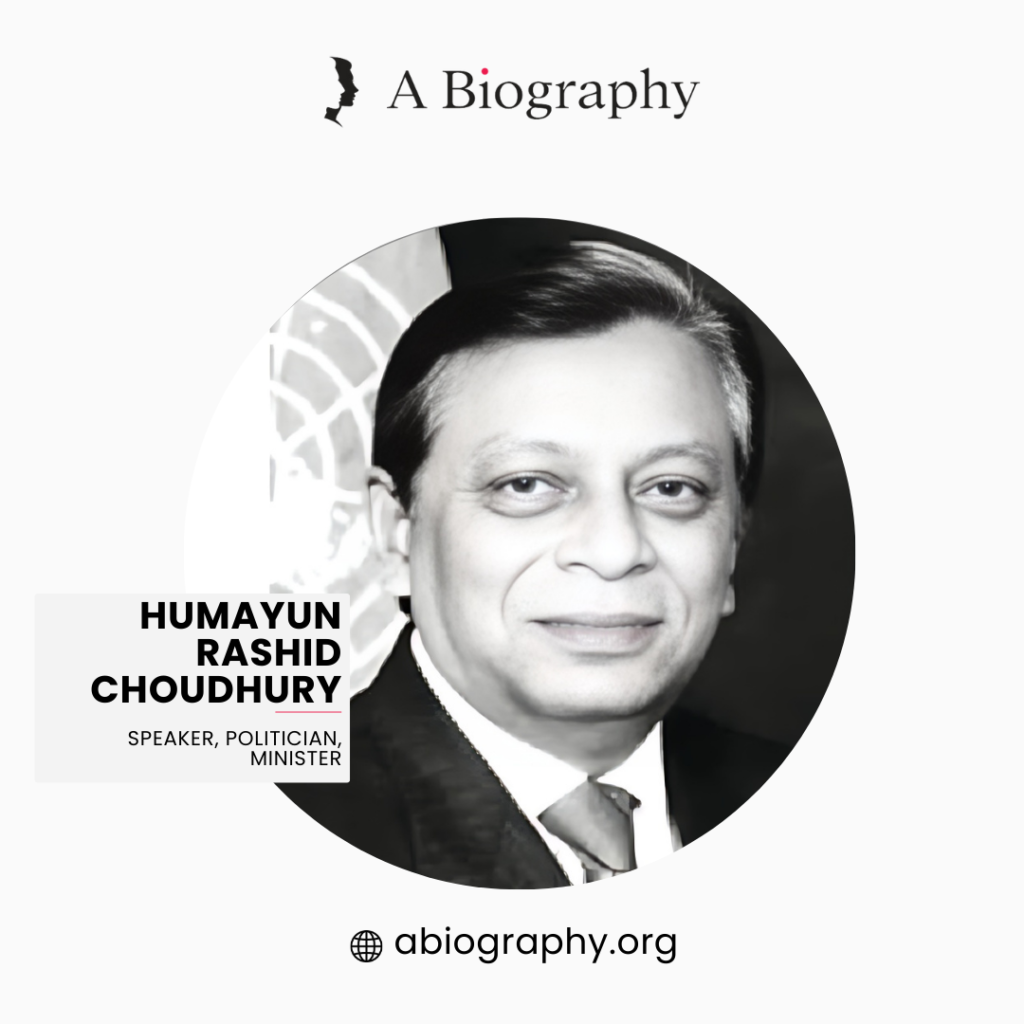BIOGRAPHY OF MATIA CHOWDHURY
Deputy Leader of the Parliament and Former Minister of Agriculture of Bangladesh
(30 June 1942 – Present)
Table of Contents
ToggleIntroduction
Born on 30 June 1942, the veteran politician Matia Chowdhury is an incumbent Deputy Leader of the House, the incumbent Member of Parliament, current presidium member of the Awami League party, and the former Minister of Agriculture.
She was born at the village named Nazirpur of Pirojpur District, Bengal Presidency, the then British India, presently in Bangladesh. Her father was a government police officer.
She passed her HSC examinations from Eden College, Dhaka. Later, completed her education by graduating from University of Dhaka.
Since her student life, she had joined politics. She was elected as the Vice-President of Dhaka Eden Girls College Students’ Union in 1963 and later as the General Secretary of Dhaka University Central Students’ Union (DUCSU) in 1964–65. She was also the president of the then East Pakistan Students’ Union in 1965–66. She is the first female in Bangladesh in these positions. During that time, she had actively participated and fought in different domestic movements like the movement against the Ayub regime, the movement against the Education Commission of 1962, anti-Ershad movement, several anti-Zia movements, and protests of the four-party alliance government, and fought against the ‘minus-two formula’. Her biggest contribution for the country was her participation in the Liberation war of 1971. She had got arrested many times for all these movements, however she remained dedicated and fearless.
During her days at the student unions, for her extraordinary leadership, fiery speeches, and adamant attitude, Matia was given the title ‘Ogni Konna’. She is popularly known by this name in South Asia. Still now, she is bold and straightforward in her speeches, yet she is an honest and humble person. She always works for the grass-root people. That is why she is loved and respected by all. She also encourages women empowerment, therefore she is seen as a role model for female political leaders.
Matia, although, started her political career with the left-wing National Awami Party, she is now one of the most senior leaders (Presidium members) of the Awami League. After the emergence of Bangladesh, Matia became the Organising Secretary of National Awami Party. Later, in 1979, she joined the Awami League. In 1991, she became a member of the parliament from Sherpur (Nakla-Nalitabari) constituency on Awami League nomination. Later, in 1996, she was chosen as the member of parliament again, for the second time, in the general elections on Awami League nomination, sworn in as the Cabinet Minister and was given the charge of Ministries of Agriculture. In 2008, in the Parliamentary Election, Matia was selected as the Member of Parliament, for the third time. Finally in 2009, she was sworn in as a Cabinet Minister and was given the duty of the Ministry of Agriculture, again.
In her personal life, she was married to Bazlur Rahman, a famous journalist, who died on 26 February 2008.
Life of "Matia Chowdhury" At a Glance
Real Name: Matia Chowdhury
Date of Birth: 30 June 1942
Father’s Name: Mohiuddin Ahmed Chowdhury
Professions:
➢ Deputy Leader of the Parliament since 10 January 2023
➢ Cabinet Minister, on June 23, 1996 and again on January 6, 2009
➢ Minister of Agriculture and Food from 1996 to 2001, and again from 2009 to 2019
➢ Vice-President, Dhaka Eden Girls College Students’ Union, in 1963
➢ General Secretary, Dhaka University Central Students’ Union (DUCSU), from 1964 to 1965
➢ President, the then East Pakistan Students’ Union, from 1965 to 1966
➢ Incumbent Member of Parliament from Sherpur-2, from 5 March, 1991 to 13 July 2001
➢ Presidium member of Awami League
Place of Birth: Nazirpur, Pirojpur, Bengal Presidency, British India
Education:
➢ HSC from Dhaka Eden College.
➢ University of Dhaka.
Married to: Bazlur Rahman
Religion: Islam
Native Language: Bangla
Political Parties: Bangladesh Awami League
Nickname: Ogni Konna or Girl of Fire
Contributions:
➢ participated in Anti-Ayub movement
➢ participated in movement against the Education Commission of 1962
➢ participated in Liberation War in 1971
➢ participated as a front line leader in anti-Zia movements from 1976 to 1981
➢ participated in anti-Ershad movement from 1983 to 1990
Early Life
On 30 June 1942, Matia was born in Nazirpur Upazila of Pirojpur District of Barisal division of the then Bengal Presidency, British India, currently in Bangladesh. Her father’s name was Mohiuddin Ahmed Chowdhury. He was a government police officer. She lived in a two-story building on the north road of Dhaka in her childhood. She is the eldest child in her family and so since her childhood, she was given many different household responsibilities.
Education
Not much information about her education is known.
She had completed her HSC examinations from Eden College, Dhaka. She then got admitted and graduated from University of Dhaka.
Career
When Matia was a student at Eden College, Dhaka, she started off her career in politics as per her own desire. According to her, time itself dragged her into politics. She chose the path of politics like other youths, students, and people of that time.
Matia is the first female chief of any student organization in Bangladesh. In 1963, she was chosen as the Vice-President of Dhaka Eden Girls College Students’ Union. Later, from 1964 to 1965, she served as the General Secretary of Dhaka University Central Students’ Union (DUCSU). She was an unparalleled student leader, during her days at University of Dhaka. During 1965-66, she was the president of the then East Pakistan Students’ Union.
After the emergence of Bangladesh, in 1971, Matia became the Organising Secretary of National Awami Party. Later, in 1979, she joined the Awami League. Since 1980, she has been serving as the presidium member of Bangladesh Awami League.
On 5 March 1991, Matia became a member of the parliament from Sherpur (Nakla-Nalitabari) constituency on Awami League nomination. She remained in the position till 13 July 2001. On June 12, 1996, she was chosen as the member of parliament again, for the second time, in the general elections on Awami League nomination. 11 days later, on June 23, 1996, she was sworn in as the Cabinet Minister and was given the responsibility of Ministries of Agriculture, Food and Disaster Management & Relief. On 29 December 2008, in the Parliamentary Election, Matia was selected as the Member of Parliament, for the third time. On January 6, 2009, she was sworn in as a Cabinet Minister and was given the charge of the Ministry of Agriculture, again. She served in this position in this role till 7 January 2019.
Since 10 January 2023, Matia has been acting as the Deputy leader of the parliamentary house. During the 21st session of 11th parliament, Matia was appointed to this new role. According to party sources, Matia’s name was also considered as the next president of the country, however, Prime Minister Sheikh Hasina wanted to keep Matia in the parliament as the post of ‘deputy leader of the house’ has remained vacant since September 11, last year, after the demise of the then deputy leader, Syeda Sajeda Chowdhury. From 2009 until her death, Syeda Sajeda Chowdhury remained in that post for three times . Matia and Sajeda were imprisoned together and have had lots of memories. As admitted by Matia herself, Sajeda had supported and gave courage to Matia when Matia just joined the party.
Till now, Matia has been one of the Presidium members of Awami League.
Contributions
Since before the liberation war of Bangladesh, Matia has dedicated her life and contributed for the country. She got arrested several times for participating in different domestic movements. Still, she did not stop for the betterment of the nation.
During the 1950s and 1960s, like other Bangladeshi women leaders, alongside with male political leaders , Matia played a leading role to free Bangladesh from the grip of Pakistan’s rule.
On 7 June 1967, she took part in the strike to advance Bangabahndhu’s six-point demand. She got arrested for participating. Coincidentally, on that day she got to meet Bangabandhu Sheikh Mujibor Rahman in the reception of the jail gate. He gave her some blessings by placing his hand on her head and told not to be afraid. This worked like a spark for her because since then she had joined in many movements fearlessly.
She actively participated in the Bangladesh’s Independence movement between the years1970 and 1971. That time, she played a significant role by campaigning, lobbying, and nursing the wounded in the war.
She took active part in protests against the 1962 Education Commission.
Furthermore, she participated in the anti-Ayub regime movement in Pakistan. She was the organizer of that movement and so she was detained in jail for about two years. She also participated and got arrested at the mass upsurge of 1969.
From 1976 to 1981, there were several anti-Zia movements. Matia, being a front line leader, joined those movements and got imprisoned many times too. From 1983 to 1990, she played a very active role in the anti-Ershad movement. That time, she got detained for eight times. Also, during all the political movements against Begum Khaleda Zia’s government, Matia was an embodiment of protest on the streets.
During the time of 2001 to 2006, she went to the streets and fought in protest of the four-party alliance government.
In 2008, she battled ferociously with all her fighting energy against the ‘minus-two formula’ put forth authoritatively by the previous caretaker administration led by Fakhruddin Ahmed. The aim of this minus-two formula was to expel the two powerful political women leaders, Sheikh Hasina and Khaleda Zia, from the country. However, this plan was demolished by Matia and other political figures’ efforts.
She is trying to help to enhance women empowerment; the role of women in different sectors of Bangladeshi society.
Awards or Achievements
She was awarded the title ‘Ogni Konna’ or Girl of Fire in South Asia for her extraordinary leadership, fiery speeches, especially on the streets and adamant attitude. During her days as the President in the student unions, she was given this title, She has always been bold and straightforward standing for what is upright. One example of this is in 2016, Matia sharply criticized the then finance minister Abul Mal Abdul Muhit in the parliament for his budget proposal to cut interest rates on savings certificates. With a tone of anger, she left a question “Won’t we push millions of middle-class people towards helplessness with this move?”. This shows she is bold, honest, and thinks for the mass of people.
Personal Life
Matia has always been a loyal, dedicated and honest person in her entire life. Not only for the country, but for the Awami League party, she has dedicated her whole life. She has become a confidante of Prime Minister Sheikh Hasina. She has stood firm by Hasina’s side during the party’s bad times. In February 2009, just after the Awami League formed the government, the Prime Minister Sheikh Hasina had faced army officers who were angry about a deadly border guard mutiny. Even at such a time, Matia had accompanied Sheikh Hasina. That is how Matia has earned the trust of Sheikh Hasina.
Matia’s boldness, leadership quality and courage to tackle any hardship is apparent in her participation from the front line in different movements, protests and especially in the liberation war. She is also very straightforward in her speech and does not hesitate to criticize wrongdoings. These have awarded her the title Ogni Konna.
Her relationship with grass-root level people as well as the party members has earned her massive respect. She always thinks and works for the commoners. She is loved by people and that is why she was selected as an MP several times during different elections. She is seen as a role model for future female politicians. Her popularity and success has inspired more women to enter the political sector. Despite all this fame, Matia is also a humble woman who never tries to brag about herself.
In marital life, Matia was married to Bazlur Rahman, editor of The Sangbad, one of the oldest Bengali-language dailies still in circulation. He was a famous journalist in the Sherpur district. He died on 26 February 2008 and since then Matia has remained as a widow.
Conclusion
Matia is one of the most influential politicians of Bangladesh. Even at the age of 81, she is an embodiment of loyalty, love and dedication towards the country and political party. Her boldness and morality inspires the young generation to stay with the right things.

